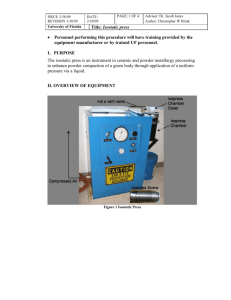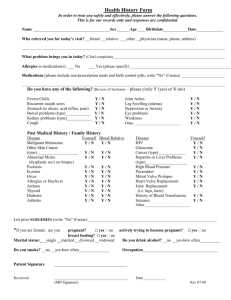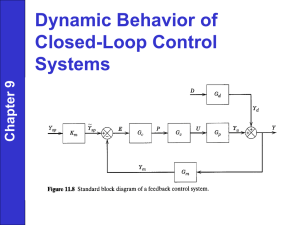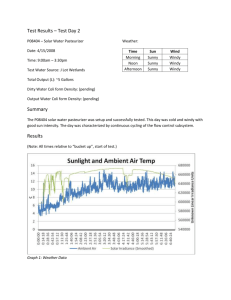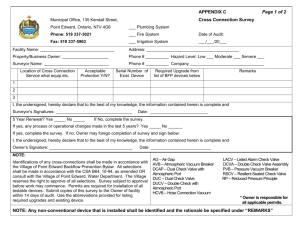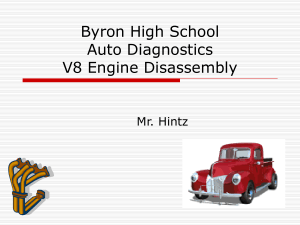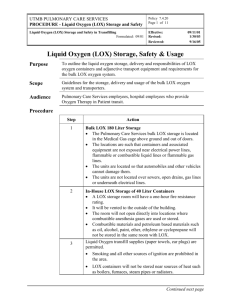SOP_Isostatic_Press
advertisement
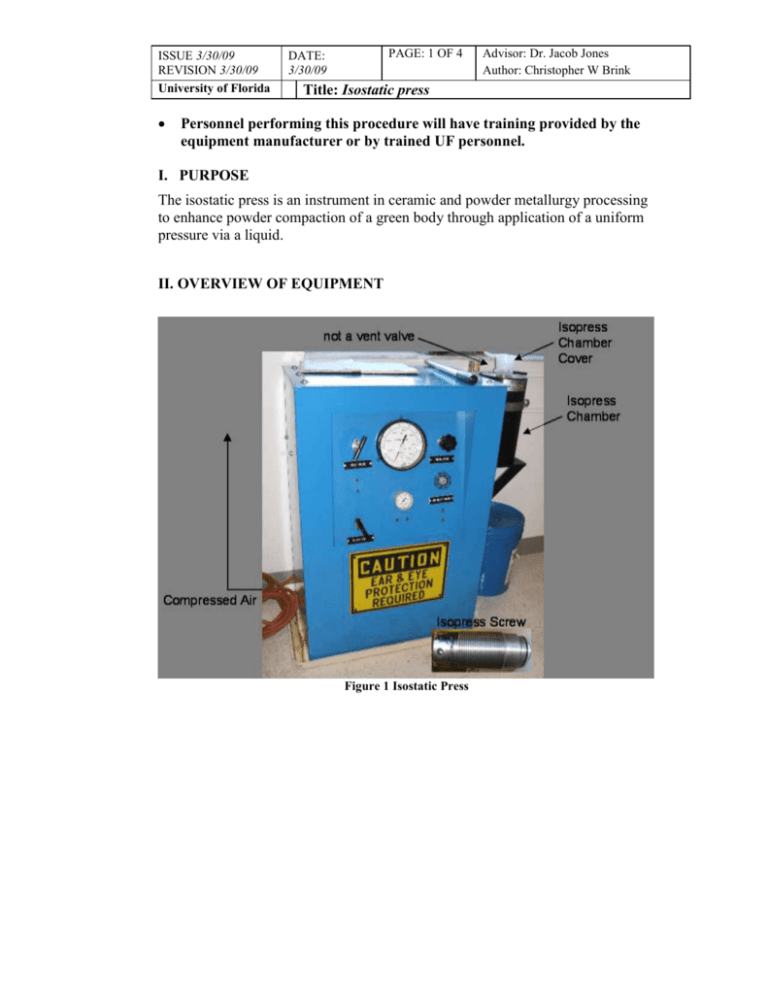
ISSUE 3/30/09 REVISION 3/30/09 University of Florida PAGE: 1 OF 4 DATE: 3/30/09 Advisor: Dr. Jacob Jones Author: Christopher W Brink Title: Isostatic press Personnel performing this procedure will have training provided by the equipment manufacturer or by trained UF personnel. I. PURPOSE The isostatic press is an instrument in ceramic and powder metallurgy processing to enhance powder compaction of a green body through application of a uniform pressure via a liquid. II. OVERVIEW OF EQUIPMENT Figure 1 Isostatic Press ISSUE 3/30/09 REVISION 3/30/09 University of Florida DATE: 3/30/09 PAGE: 2 OF 4 Advisor: Dr. Jacob Jones Author: Christopher W Brink Title: Isostatic press Figure 2 Isostatic Press front panel III. RESOURCES Necessary information or equipment that is needed for replacing the motor brushes is listed here. Required PPE is listed and should be closely followed. A. Resources (Prior knowledge and needed materials) 1. Compressed Air Line 2. Hydraulic Oil 3. Isopress screw 4. Wire basket 5. PPE a. gloves b. eyeglasses IV. PROCEDURE If the test follows an ASTM standard or any other generally accepted standard please indicate using the proper notation. 1. Locate the isopress screw (pictured figure 1) and the wire basket sample holder 2. Place the sample in the sample holder and drop sample holder into the oil of the isopress chamber. Care should be taken to make sure the sample does not contaminate the isopress oil. Recommended is to place the sample in a balloon, evacuate the balloon, and the place the balloon in the wire basket. ISSUE 3/30/09 REVISION 3/30/09 University of Florida DATE: 3/30/09 PAGE: 3 OF 4 Advisor: Dr. Jacob Jones Author: Christopher W Brink Title: Isostatic press 3. Ensure the vent valve and the block valve (pictured figure 2) are all the way open (counterclockwise). 4. Screw the isopress screw into the isopress chamber until tight 5. Close the vent valve and open the “not a vent” valve (pictured figure 1) 6. Slowly open the compressed air valve until the pump is operating steadily 7. Observe the glass viewport near the “not a vent” valve. Once oil flows through the viewport close the “not a vent” valve. 8. Continue to pump the system to the desired pressure and then close the compressed air valve. Typical pressures are ~ 200 MPa. 9. Hold pressure for the desired amount of time. Typical times are around 3 minutes. 10. Slowly open the vent valve to allow pressure to decrease. Leave the vent valve open. 11. Unscrew and remove the isopress screw. 12. Remove the wire basket sample holder from the oil using the metal hook. 13. Take out the sample. Return the isopress screw, the wire basket, and the metal hook to their box. 14. Cover the oil of the isopress chamber using the plastic cup provided. 15. Clean up your mess! Especially the oil. B. Clean-up and Maintenance 1. This machine requires some maintenance to keep in proper working condition. Maintenance includes keeping the machine clean, checking and maintaining the oil level, replacing the oil filter, and checking the air filter. 2. The oil level should be just below the oil return line for the “not a vent” valve connecting to the isopress chamber. If you believe the oil is low, do not add any, just notify the person in charge of the instrument. 3. Replacement oil filters need to be ordered from the Fluitron corporation. To replace the oil filter valve is turn its valve perpendicular to the line and the oil filter is removed and replaced then. Return the oil filter valve to parallel to flow. A few minutes of pumping is needed after this to re-prime the pump. 4. The isopress screw seal can fail from time to time. The metal ring will flatten out and expand making it unable to seal. The rubber o-ring might degrade and rip. New seals can be ordered from Fluitron. Usually it is best to replace the metal ring and the rubber o-ring together. 5. The oil used in this machine has a tendency to get everywhere, be careful to clean up all spilt oil as it can ruin clothing, tables, and is hazardous on tile floor. C. Emergency Procedure and Shutdown 1. Turn off the valve to shut off the compressed air. Open the vent valve. ISSUE 3/30/09 REVISION 3/30/09 University of Florida DATE: 3/30/09 PAGE: 4 OF 4 Advisor: Dr. Jacob Jones Author: Christopher W Brink Title: Isostatic press D. Safety Hazards 1. Equipment is under high pressure. Failure will involve potential projectiles so eye protection is required. 2. Oil can make the floor and tools needed slippery.
